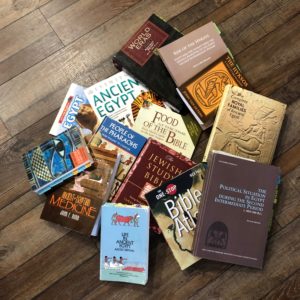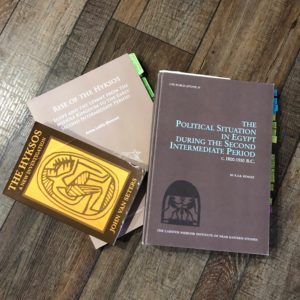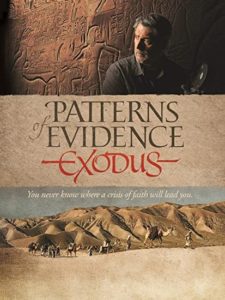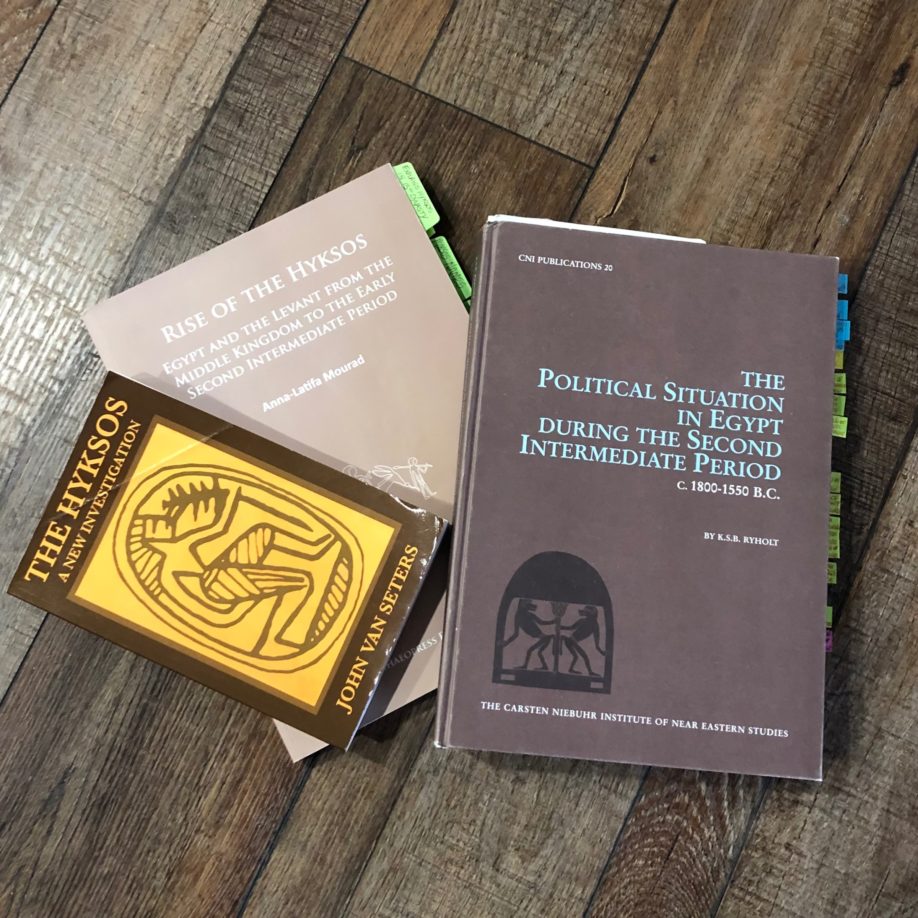 After people read my books, they often ask, “Where do you get all your research?”
After people read my books, they often ask, “Where do you get all your research?”
I wish there was a single, magic well of information that we could simply plumb for depths of ancient historical knowledge. But there isn’t. 🙁
Research comes in fits and spirts. Long days (and nights) and lots of skimming books and online info. I love actual BOOKS best (as you can tell from the above picture). But scholarly papers–many available online–are sometimes more helpful because they focus on a specific topic. I’ll share some of my favorite websites below.
To Learn More About My Research
I’ve written other posts about my research process in past years, so if you’re REALLY interested, you can find more information in those:
- Look Inside My Research Process
- How to Research the Bible’s Shady Ladies
- Isaiah’s Martyrdom – How to Sift Research
Each of the previous posts give you a slightly different perspective on my process. Today’s post will focus more on the road I traveled to form the plot and characters of Potiphar’s Wife.
How Was Potiphar’s Wife Research Different?
Joseph’s story felt very intimidating to me. Perhaps because I found this quote (paraphrased) from one of the resources on my first day of research:
“No one can definitively determine the dates for Joseph’s sojourn in Egypt or the pharaoh he served.”
Peachy. So, if all the smart people can’t agree on WHEN Joseph lived in Egypt–which Pharaoh he served, what time period endured the abundance & famine–how would a simpleton like me make this a believable story?
The answer, of course, was . . . I couldn’t. But as God does every time I begin a new project, He led me from one exciting discovery to another.
#1 Secret to Success – Finding the Experts
I’ve always known it was important to read the footnotes in any scholarly work, whether it was a research book or online document. Yes, footnotes were mostly dry and uninteresting, but it was repeated authors’ names I looked for!
 When I notice a scholar’s name repeatedly quoted on a certain topic or period of history, it’s a clear indicator that he/she is a well-respected expert in that field of study. Checking bibliographies is one of the quickest ways to find a reliable resource.
When I notice a scholar’s name repeatedly quoted on a certain topic or period of history, it’s a clear indicator that he/she is a well-respected expert in that field of study. Checking bibliographies is one of the quickest ways to find a reliable resource.
As I began checking footnotes and bibliographies, I saw two names quoted most often as experts during the ancient dynasty most likely to be Joseph’s time in Egypt. Manfred Bietak and K.S.B. Ryholt were quoted in almost every article or book I read about they Hyksos period of Egypt’s history.
#2 Secret to Success – Remember It’s Fiction
 I researched and read A LOT before making the decision to place Joseph in the Hyksos period. Six months after starting to write, a friend shared a DVD with me called, Patterns of Evidence: The Exodus (my Amazon aff link). Have you seen it?
I researched and read A LOT before making the decision to place Joseph in the Hyksos period. Six months after starting to write, a friend shared a DVD with me called, Patterns of Evidence: The Exodus (my Amazon aff link). Have you seen it?
It’s an absolutely FASCINATING look at the archaeological evidence for the Exodus, much of it overlooked because experts have been looking in the wrong place at the wrong time for many years! If I were to believe the information on the DVD, my whole plot for Potiphar’s Wife (aff link for Kindle) would have been down the toilet–because it took Joseph OUT of the Hyksos dynasty, placing him centuries BEFORE!
When Research Conflicts:
Six MONTHS of blood, sweat, and tears down the tubes?
NO way! I always want to be historically accurate, but there are many scholars who still agree that Joseph lived in Egypt during the Hyksos dynasty. If I were writing an academic thesis or dissertation, I would absolutely need to dig into further study.
But I’m writing FICTION. Biblical fiction. Yes, it’s important that my historical facts are as true as I can possibly make them, but the BIBLICAL TRUTH is THE most important foundation I’m building. As long as THAT’S not compromised, I can build a story with plausible historical data and feel good about it.
#3 Secret to Success – Hold History Loosely
Closely related to Secret #2 is my encouragement to hold history loosely–especially when it comes to accounts that expand on the Truth we know from Scripture.
The Bible never tells us the name of Potiphar’s wife, but her name is given as Zuleika in two very reliable historical records (the Quran and Ginzberg’s, Legends of the Jews). In both stories, Zuleika invites her aristocratic friends over to see her handsome Hebrew slave. The women are so taken with Joseph that while peeling oranges, they cut themselves without even realizing it!
The historical accounts are quite dramatic–and fantastical–but I included a much calmer version of the story in my novel simply because it was recorded by two such respected resources. Did I include EVERY detail of the historical accounts?
Absolutely NOT! My story would have read like a comic book! As an author of historical fiction, I must filter out the things that will distract the modern reader from the TRUTH they need to see.
Walking the Fine Line
As you may be starting to realize, nearly every research decision must be weighed and re-weighed prayerfully. Let me reiterate my 3-layered approach to biblical fiction:
- Biblical TRUTH is the foundation – unchangeable; non-negotiable.
- Historical FACTS are the building blocks – formed by reading widely and finding blocks that can fit together with as little “chiseling” as possible.
- Creative FICTION is the mortar that holds Truth and fact together, making the story a believable world that draws readers in–and then sends them rushing to their Bibles to find more Truth.
Joseph’s Hyksos World
 See all those tabs and turned-down pages? Yes, I’ve read LOTS and LOTS about the Hyksos–a term that simply means, “foreign rulers.” They Hyksos Dynasty describes a period in Egypt’s history when their nation was divided into Upper Egypt in the south and Lower Egypt in the north–and Lower Egypt was ruled by non-Egyptian kings.
See all those tabs and turned-down pages? Yes, I’ve read LOTS and LOTS about the Hyksos–a term that simply means, “foreign rulers.” They Hyksos Dynasty describes a period in Egypt’s history when their nation was divided into Upper Egypt in the south and Lower Egypt in the north–and Lower Egypt was ruled by non-Egyptian kings.
During the Hyksos’s reign, Avaris was Lower Egypt’s capital in the fertile Delta region–an area the Bible calls, Goshen. The Hyksos were Semites (descendants of Shem, Noah’s firstborn son) who migrated from Canaan after being pushed from their land by wealthy Bedouins.
Do you remember any stories from the Bible of a Bedouin family who prospered in Canaan and might have pushed some Canaanites off their land? Ummm, it made sense to me that Abraham, Isaac, and Jacob were those wealthy Bedouins, and the Hyksos reign began shortly before Joseph was sold into slavery in Egypt.
Today’s Questions:
- I’ll leave this part open for YOUR questions today? What do YOU want to know about my research process or Joseph’s life among the Hyksos?
As promised, here are a few of my favorite academic (or most reliable) websites:
- academia.edu
- researchgate.net
- jstor.org
- full copy of Legends of the Jews
- jewishvirtuallibrary.org
- jewishencyclopedia.com
- alephbeta.org




Comments 9
I love this post! Your impeccable research shows through every book–it lends such richness and authenticity to your writing. Looking at an article or book’s bibliography sure is a great way to get up to speed fast on people widely published on a topic. And I don’t know what I’d do without JSTOR. Great to learn of more sources, too. Thank you, Mesu!
Author
Hooray! Thanks for your encouragement, Lana. So glad this was helpful to you. 😘
I am amazed at all the research you do! And how your mind works..and what a great job you do…at all you do, my darling daughter!! Thanks for writing the books you do! I love them…and learn so much from them. Thanks.
Author
You might be a little biased, Mama, but I’m so thrilled that you enjoy my books–and short stories! ❤️
Thank you for help on biblical research. I have been researching if we still celebrate Jubilee which has been a challenge. Some say this is the year, 2022, of Jubilee while others say 2025 is the year of Jubilee. And I read we do not celebrate because the temple has not been rebuilt. I even asked our intern pastor. Point being, I thought of you, and now you have sent these amazing helps!!
Thank You Mesu!!!
Author
Oh, hooray! Yes, you should be able to find good information on the years of Jubilee. I would stick with Jewish sites for that info. Aleph Beta has FANTASTIC free videos, and I forgot to mention chabad.org–who has really good modern info on Jewish practices as well as some historical insights. Hope that helps!
Thank you, Mesu, for such an interesting and insightful post. How books are ‘born’ is fascinating and it seems as though all authors have different strategies. This book promises to be an excellent read!
Author
We authors are a colorful bunch for sure, Linda! And no two book “births” are the same–just as no children are the same. It’s still fascinating for me even after twelve! I hope you enjoy Zully’s story. She’s been quite a pill, but I love how the Lord shaped her in the end! ❤️
Pingback: Potiphar's Wife Q&A - Part I (Research) - Mesu Andrews